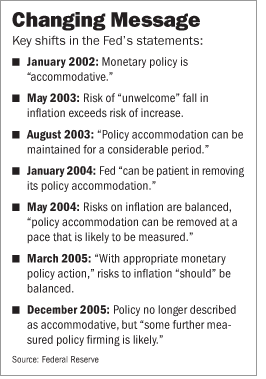
The Fed increased the [Federal Funds rate to 4.25% [WSJ]](http://online.wsj.com/article_print/SB113439211778920082.html), the 13th increased since June 2004. However, for the first time since 2002, it omitted the word “accommodative” which means that rates are nearing the point where they neither stimulate or deter economic growth. The less restrictive wording will give Bernanke. Greenspan’s replacement, a little more flexibility.
For housing: If inflation is in check, then mortgage rates may be less likely to move a whole lot higher making the transition to a less frenzied housing market more attainable.
However, its not clear whether inflation really is in check. Barry Ritholtz of the Maxim Group and webmaster of [Big Picture](http://bigpicture.typepad.com/comments/2005/12/economists_reac_1.html) clearly disagrees with this assessment:
“Core inflation has stayed relatively low in recent months and longer-term inflation expectations remain contained.” Quite frankly, we do not believe them. We know that beyond the rises in food and energy prices, nearly everything — from healthcare to building materials to education costs to insurance to commodities — costs more. And gold, the world’s best inflation indicator, is well over $500 per ounce. Where ever we look, we see evidence that prices have limited stability and an upward bias.”
Barry adds in a comment:
>Microeconomics concerns things that
>economists are specifically wrong about,
>while macroeconomics concerns things
>economists are wrong about generally.”
> – P.J. O’Rourke
The WSJ summarizes:
“Overall inflation recently topped 4%, at an annual rate, because of soaring energy prices. Excluding food and energy, it is only about 2%, but Fed officials worry that higher energy prices will eventually lead to higher wage demands and prices for other goods and services. Although gasoline prices have fallen back from their levels reached just after Hurricane Katrina struck the Gulf Coast, natural-gas prices have climbed, hitting a record yesterday as cold weather blanketed the Northeast.”

